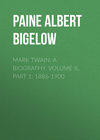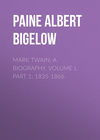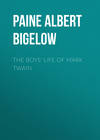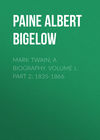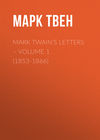Kitabı oku: «Mark Twain: A Biography. Volume II, Part 1: 1886-1900», sayfa 7
CXXIII
THE GRANT SPEECH OF 1879
If the lunar rainbow had any fortuitous significance, perhaps we may find it in the two speeches which Mark Twain made in November and December of that year. The first of these was delivered at Chicago, on the occasion of the reception of General Grant by the Army of the Tennessee, on the evening of November 73, 1879. Grant had just returned from his splendid tour of the world. His progress from San Francisco eastward had been such an ovation as is only accorded to sovereignty. Clemens received an invitation to the reunion, but, dreading the long railway journey, was at first moved to decline. He prepared a letter in which he made "business" his excuse, and expressed his regret that he would not be present to see and hear the veterans of the Army of the Tennessee at the moment when their old commander entered the room and rose in his place to speak.
"Besides," he said, "I wanted to see the General again anyway and renew the acquaintance. He would remember me, because I was the person who did not ask him for an office."
He did not send the letter. Reconsidering, it seemed to him that there was something strikingly picturesque in the idea of a Confederate soldier who had been chased for a fortnight in the rain through Ralls and Monroe counties, Missouri, now being invited to come and give welcome home to his old imaginary pursuer. It was in the nature of an imperative command, which he could not refuse to obey.
He accepted and agreed to speak. They had asked him to respond to the toast of "The Ladies," but for him the subject was worn out. He had already responded to that toast at least twice. He telegraphed that there was one class of the community that had always been overlooked upon such occasions, and that if they would allow him to do so he would take that class for a toast: the babies. Necessarily they agreed, and he prepared himself accordingly.
He arrived in Chicago in time for the prodigious procession of welcome. Grant was to witness the march from a grand reviewing stand, which had been built out from the second story of the Palmer House. Clemens had not seen the General since the "embarrassing" introduction in Washington, twelve years before. Their meeting was characteristic enough. Carter Harrison, Mayor of Chicago, arriving with Grant, stepped over to Clemens, and asked him if he wouldn't like to be presented. Grant also came forward, and a moment later Harrison was saying:
"General, let me present Mr. Clemens, a man almost as great as yourself." They shook hands; there was a pause of a moment, then Grant said, looking at him gravely:
"Mr. Clemens, I am not embarrassed, are you?"
So he remembered that first, long-ago meeting. It was a conspicuous performance. The crowd could not hear the words, but they saw the greeting and the laugh, and cheered both men.
Following the procession, there were certain imposing ceremonies of welcome at Haverly's Theater where long, laudatory eloquence was poured out upon the returning hero, who sat unmoved while the storm of music and cheers and oratory swept about him. Clemens, writing of it that evening to Mrs. Clemens, said:
I never sat elbow to elbow with so many historic names before.
Grant, Sherman, Sheridan, Schofield, Pope, Logan, and so on.
What an iron man Grant is! He sat facing the house, with his right leg crossed over his left, his right boot sole tilted up at an angle, and his left hand and arm reposing on the arm of his chair. You note that position? Well, when glowing references were made to other grandees on the stage, those grandees always showed a trifle of nervous consciousness, and as these references came frequently the nervous changes of position and attitude were also frequent. But Grant! He was under a tremendous and ceaseless bombardment of praise and congratulation; but as true as I'm sitting here he never moved a muscle of his body for a single instant during thirty minutes! You could have played him on a stranger for an effigy. Perhaps he never would have moved, but at last a speaker made such a particularly ripping and blood-stirring remark about him that the audience rose and roared and yelled and stamped and clapped an entire minute—Grant sitting as serene as ever-when General Sherman stepped up to him, laid his hand affectionately on his shoulder, bent respectfully down, and whispered in his ear. Then Grant got up and bowed, and the storm of applause swelled into a hurricane.
But it was the next evening that the celebration rose to a climax. This was at the grand banquet at the Palmer House, where six hundred guests sat down to dinner and Grant himself spoke, and Logan and Hurlbut, and Vilas and Woodford and Pope, fifteen in all, including Robert G. Ingersoll and Mark Twain. Chicago has never known a greater event than that dinner, for there has never been a time since when those great soldiers and citizens could have been gathered there.
To Howells Clemens wrote:
Imagine what it was like to see a bullet-shredded old battle-flag reverently unfolded to the gaze of a thousand middle-aged soldiers, most of whom hadn't seen it since they saw it advancing over victorious fields when they were in their prime. And imagine what it was like when Grant, their first commander, stepped into view while they were still going mad over the flag, and then right in the midst of it all somebody struck up "When we were marching through Georgia." Well, you should have heard the thousand voices lift that chorus and seen the tears stream down. If I live a hundred years I sha'n't ever forget these things, nor be able to talk about them. I sha'n't ever forget that I saw Phil Sheridan, with martial cloak and plumed chapeau, riding his big black horse in the midst of his own cannon; by all odds the superbest figure of a soldier. I ever looked upon!
Grand times, my boy, grand times!
Mark Twain declared afterward that he listened to four speeches that night which he would remember as long as he lived. One of them was by Emory Storrs, another by General Vilas, another by Logan, and the last and greatest by Robert Ingersoll, whose eloquence swept the house like a flame. The Howells letter continues:
I doubt if America has ever seen anything quite equal to it; I am well satisfied I shall not live to see its equal again. How pale those speeches are in print, but how radiant, how full of color, how blinding they were in the delivery! Bob Ingersoll's music will sing through my memory always as the divinest that ever enchanted my ears. And I shall always see him, as he stood that night on a dinner-table, under the flash of lights and banners, in the midst of seven hundred frantic shouters, the most beautiful human creature that ever lived. "They fought, that a mother might own her child." The words look like any other print, but, Lord bless me! he borrowed the very accent of the angel of mercy to say them in, and you should have seen that vast house rise to its feet; and you should have heard the hurricane that followed. That's the only test! People may shout, clap their hands, stamp, wave their napkins, but none but the master can make them get up on their feet.
Clemens's own speech came last. He had been placed at the end to hold the house. He was preceded by a dull speaker, and his heart sank, for it was two o'clock and the diners were weary and sleepy, and the dreary speech had made them unresponsive.
They gave him a round of applause when he stepped up upon the table in front of him—a tribute to his name. Then he began the opening words of that memorable, delightful fancy.
"We haven't all had the good-fortune to be ladies; we haven't all been generals, or poets, or statesmen; but when the toast works down to the babies—we stand on common ground—"
The tired audience had listened in respectful silence through the first half of the sentence. He made one of his effective pauses on the word "babies," and when he added, in that slow, rich measure of his, "we stand on common ground," they let go a storm of applause. There was no weariness and inattention after that. At the end of each sentence, he had to stop to let the tornado roar itself out and sweep by. When he reached the beginning of the final paragraph, "Among the three or four million cradles now rocking in the land are some which this nation would preserve for ages as sacred things if we could know which ones they are," the vast audience waited breathless for his conclusion. Step by step he led toward some unseen climax—some surprise, of course, for that would be his way. Then steadily, and almost without emphasis, he delivered the opening of his final sentence:
"And now in his cradle, somewhere under the flag, the future illustrious commander-in-chief of the American armies is so little burdened with his approaching grandeurs and responsibilities as to be giving his whole strategic mind, at this moment, to trying to find out some way to get his own big toe into his mouth, an achievement which (meaning no disrespect) the illustrious guest of this evening also turned his attention to some fifty-six years ago."
He paused, and the vast crowd had a chill of fear. After all, he seemed likely to overdo it to spoil everything with a cheap joke at the end. No one ever knew better than Mark Twain the value of a pause. He waited now long enough to let the silence become absolute, until the tension was painful, then wheeling to Grant himself he said, with all the dramatic power of which he was master:
"And if the child is but the father of the man, there are mighty few who will doubt that he succeeded!"
The house came down with a crash. The linking of their hero's great military triumphs with that earliest of all conquests seemed to them so grand a figure that they went mad with the joy of it. Even Grant's iron serenity broke; he rocked and laughed while the tears streamed down his cheeks.
They swept around the speaker with their congratulations, in their efforts to seize his hand. He was borne up and down the great dining-hall. Grant himself pressed up to make acknowledgments.
"It tore me all to pieces," he said; and Sherman exclaimed, "Lord bless you, my boy! I don't know how you do it!"
The little speech has been in "cold type" so many years since then that the reader of it to-day may find it hard to understand the flame of response it kindled so long ago. But that was another day—and another nation—and Mark Twain, like Robert Ingersoll, knew always his period and his people.
CXXIV
ANOTHER "ATLANTIC" SPEECH
The December good-fortune was an opportunity Clemens had to redeem himself with the Atlantic contingent, at a breakfast given to Dr. Holmes.
Howells had written concerning it as early as October, and the first impulse had been to decline. It would be something of an ordeal; for though two years had passed since the fatal Whittier dinner, Clemens had not been in that company since, and the lapse of time did not signify. Both Howells and Warner urged him to accept, and he agreed to do so on condition that he be allowed to speak.
If anybody talks there I shall claim the right to say a word myself, and be heard among the very earliest, else it would be confoundedly awkward for me—and for the rest, too. But you may read what I say beforehand, and strike out whatever you choose.
Howells advised against any sort of explanation. Clemens accepted this as wise counsel, and prepared an address relevant only to the guest of honor.
It was a noble gathering. Most of the guests of the Whittier dinner were present, and this time there were ladies. Emerson, Longfellow, and Whittier were there, Harriet Beecher Stowe and Julia Ward Howe; also the knightly Colonel Waring, and Stedman, and Parkman, and grand old John Bigelow, old even then.—[He died in 1911 in his 94th year.]
Howells was conservative in his introduction this time. It was better taste to be so. He said simply:
"We will now listen to a few words of truth and soberness from Mark Twain."
Clemens is said to have risen diffidently, but that was his natural manner. It probably did not indicate anything of the inner tumult he really felt.
Outwardly he was calm enough, and what he said was delicate and beautiful, the kind of thing that he could say so well. It seems fitting that it should be included here, the more so that it tells a story not elsewhere recorded. This is the speech in full:
MR. CHAIRMAN, LADIES, AND GENTLEMEN,—I would have traveled a much greater distance than I have come to witness the paying of honors to Dr. Holmes, for my feeling toward him has always been one of peculiar warmth. When one receives a letter from a great man for the first time in his life it is a large event to him, as all of you know by your own experience. You never can receive letters enough from famous men afterward to obliterate that one or dim the memory of the pleasant surprise it was and the gratification it gave you. Lapse of time cannot make it commonplace or cheap. Well, the first great man who ever wrote me a letter was our guest, Oliver Wendell Holmes. He was also the first great literary man I ever stole anything from, and that is how I came to write to him and he to me. When my first book was new a friend of mine said, "The dedication is very neat." Yes, I said, I thought it was. My friend said, "I always admired it, even before I saw it in The Innocents Abroad." I naturally said, "What do you mean? Where did you ever see it before?" "Well, I saw it first, some years ago, as Dr. Holmes's dedication to his Songs in Many Keys." Of course my first impulse was to prepare this man's remains for burial, but upon reflection I said I would reprieve him for a moment or two, and give him a chance to prove his assertion if he could. We stepped into a book-store. and he did prove it. I had stolen that dedication almost word for word. I could not imagine how this curious thing happened; for I knew one thing, for a dead certainty—that a certain amount of pride always goes along with a teaspoonful of brains, and that this pride protects a man from deliberately stealing other people's ideas. That is what a teaspoonful of brains will do for a man, and admirers had often told me I had nearly a basketful, though they were rather reserved as to the size of the basket. However, I thought the thing out and solved the mystery. Some years before I had been laid up a couple of weeks in the Sandwich Islands, and had read and reread Dr. Holmes's poems till my mental reservoir was filled with them to the brim. The dedication lay on top and handy, so by and by I unconsciously took it. Well, of course, I wrote to Dr. Holmes and told him I hadn't meant to steal, and he wrote back and said, in the kindest way, that it was all right, and no harm done, and added that he believed we all unconsciously worked over ideas gathered in reading and hearing, imagining they were original with ourselves. He stated a truth and did it in such a pleasant way, and salved over my sore spot so gently and so healingly, that I was rather glad I had committed the crime, for the sake of the letter. I afterward called on him and told him to make perfectly free with any ideas of mine that struck him as good protoplasm for poetry. He could see by that time that there wasn't anything mean about me; so we got along, right from the start.—[Holmes in his letter had said: "I rather think The Innocents Abroad will have many more readers than Songs in Many Keys. . . You will be stolen from a great deal oftener than you will borrow from other people."]
I have met Dr. Holmes many times since; and lately he said—However, I am wandering wildly away from the one thing which I got on my feet to do; that is, to make my compliments to you, my fellow-teachers of the great public, and likewise to say I am right glad to see that Dr. Holmes is still in his prime and full of generous life, and as age is not determined by years but by trouble, and by infirmities of mind and body, I hope it may be a very long time yet before any can truthfully say, "He is growing old."
Whatever Mark Twain may have lost on that former occasion, came back to him multiplied when he had finished this happy tribute. So the year for him closed prosperously. The rainbow of promise was justified.
CXXV
THE QUIETER THINGS OF HOME
Upset and disturbed as Mark Twain often was, he seldom permitted his distractions to interfere with the program of his fireside. His days and his nights might be fevered, but the evenings belonged to another world. The long European wandering left him more than ever enamoured of his home; to him it had never been so sweet before, so beautiful, so full of peace. Company came: distinguished guests and the old neighborhood circles. Dinner-parties were more frequent than ever, and they were likely to be brilliant affairs. The best minds, the brightest wits, gathered around Mark Twain's table. Booth, Barrett, Irving, Sheridan, Sherman, Howells, Aldrich: they all assembled, and many more. There was always some one on the way to Boston or New York who addressed himself for the day or the night, or for a brief call, to the Mark Twain fireside.
Certain visitors from foreign lands were surprised at his environment, possibly expecting to find him among less substantial, more bohemian surroundings. Henry Drummond, the author of Natural Law in the Spiritual World, in a letter of this time, said:
I had a delightful day at Hartford last Wednesday . . . . Called on Mark Twain, Mrs. Harriet Beecher Stowe, and the widow of Horace Bushnell. I was wishing A–had been at the Mark Twain interview. He is funnier than any of his books, and to my surprise a most respected citizen, devoted to things esthetic, and the friend of the poor and struggling.—[Life of Henry Drummond, by George Adam Smith.]
The quieter evenings were no less delightful. Clemens did not often go out. He loved his own home best. The children were old enough now to take part in a form of entertainment that gave him and them especial pleasure-acting charades. These he invented for them, and costumed the little performers, and joined in the acting as enthusiastically and as unrestrainedly as if he were back in that frolicsome boyhood on John Quarles's farm. The Warner and Twichell children were often there and took part in the gay amusements. The children of that neighborhood played their impromptu parts well and naturally. They were in a dramatic atmosphere, and had been from infancy. There was never any preparation for the charades. A word was selected and the parts of it were whispered to the little actors. Then they withdrew to the hall, where all sorts of costumes had been laid out for the evening, dressed their parts, and each detachment marched into the library, performed its syllable and retired, leaving the audience, mainly composed of parents, to guess the answer. Often they invented their own words, did their own costuming, and conducted the entire performance independent of grown-up assistance or interference. Now and then, even at this early period, they conceived and produced little plays, and of course their father could not resist joining in these. At other times, evenings, after dinner, he would sit at the piano and recall the old darky songs-spirituals and jubilee choruses-singing them with fine spirit, if not with perfect technic, the children joining in these moving melodies.
He loved to read aloud to them. It was his habit to read his manuscript to Mrs. Clemens, and, now that the children were older, he was likely to include them in his critical audience.
It would seem to have been the winter after their return from Europe that this custom was inaugurated, for 'The Prince and the Pauper' manuscript was the first one so read, and it was just then he was resuming work on this tale. Each afternoon or evening, when he had finished his chapter, he assembled his little audience and read them the result. The children were old enough to delight in that half real, half fairy tale of the wandering prince and the royal pauper: and the charm and simplicity of the story are measurably due to those two small listeners, to whom it was adapted in that early day of its creation.
Clemens found the Prince a blessed relief from 'A Tramp Abroad', which had become a veritable nightmare. He had thought it finished when he left the farm, but discovered that he must add several hundred pages to complete its bulk. It seemed to him that he had been given a life-sentence. He wrote six hundred pages and tore up all but two hundred and eighty-eight. He was about to destroy these and begin again, when Mrs. Clemens's health became poor and he was advised to take her to Elmira, though it was then midwinter. To Howells he wrote:
I said, "if there is one death that is painfuler than another, may I get it if I don't do that thing."
So I took the 288 pages to Bliss and told him that was the very last line I should ever write on this book (a book which required 600 pages of MS., and I have written nearly four thousand, first and last).
I am as soary (and flighty) as a rocket to-day, with the unutterable joy of getting that Old Man of the Sea off my back, where he has been roosting more than a year and a half.
They remained a month at Elmira, and on their return Clemens renewed work on 'The Prince and the Pauper'. He reported to Howells that if he never sold a copy his jubilant delight in writing it would suffer no diminution. A week later his enthusiasm had still further increased:
I take so much pleasure in my story that I am loath to hurry, not wanting to get it done. Did I ever tell you the plot of it? It begins at 9 A.M., January 27, 1547.
He follows with a detailed synopsis of his plot, which in this instance he had worked out with unusual completeness—a fact which largely accounts for the unity of the tale. Then he adds:
My idea is to afford a realizing sense of the exceeding severity of the laws of that day by inflicting some of their penalties upon the king himself, and allowing him a chance to see the rest of them applied to others; all of which is to account for certain mildnesses which distinguished Edward VI.'s reign from those that precede it and follow it.
Imagine this fact: I have even fascinated Mrs. Clemens with this yarn for youth. My stuff generally gets considerable damning with faint praise out of her, but this time it is all the other way. She is become the horse-leech's daughter, and my mill doesn't grind fast enough to suit her. This is no mean triumph, my dear sir.
He forgot, perhaps, to mention his smaller auditors, but we may believe they were no less eager in their demands for the tale's continuance.
